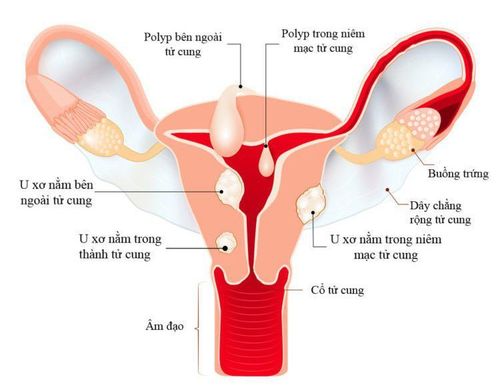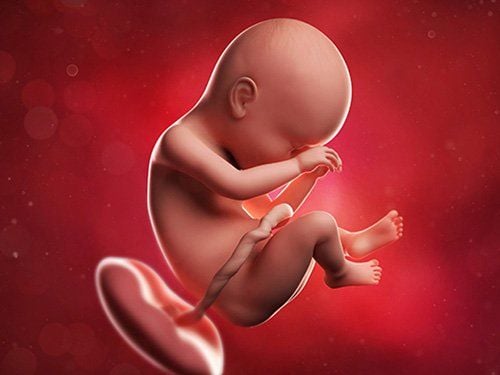This is an automatically translated article.
The article was consulted with Specialist Doctor II - Nguyen Thi Minh Tuyet - Head of Obstetrics and Gynecology Department - Vinmec Central Park International General Hospital.Miscarriage and threatened miscarriage is something no one wants. To minimize this risk, you need to learn carefully about strange signs from the first weeks of pregnancy so that you can go to the doctor in time.
1. Threat of miscarriage
1.1 Signs of threatened miscarriage Threat of miscarriage is a condition where the fetus is still alive and developing in the uterus, but the pregnant woman has signs such as abdominal pain and bleeding. This phenomenon usually occurs in the first weeks of pregnancy, when the fertilized egg is not firmly attached to the uterus, so it is easy to be shed. When there are signs of threatened miscarriage below, pregnant women need to go immediately. Check to find out the cause and have timely prevention:Bleeding, pink discharge with mucus Pain or dull pain intermittently in the lower abdomen and fatigue in the lumbar region. Negative pregnancy test
Trắc nghiệm: Bạn có hiểu đúng về dấu hiệu mang thai sớm?
Các dấu hiệu mang thai sớm không phải chỉ mỗi trễ kinh mà còn có rất nhiều dấu hiệu khác như xuất huyết âm đạo, ngực căng tức,… Điểm xem bạn biết được bao nhiêu dấu hiệu mang thai sớm thông qua bài trắc nghiệm này nhé!
Concussions during pregnancy: Mother falls, bumps, inadequate nutrition, overwork,...
Abnormalities of embryo chromosomes: Right during fertilization, There is a problem with paternal and maternal chromosomes joining together. This is also the main reason why the fetus will be eliminated naturally or even the mother may have a miscarriage before knowing she is pregnant.

2. Miscarriage
2.1. Signs of Miscarriage A miscarriage is the termination of a pregnancy before the fetus is viable. The fetus is expelled from the uterus before 23 weeks or the fetal weight is less than 500g. When experiencing these signs, pregnant women should see a specialist immediately:Loss of pregnancy symptoms: For mothers who are having morning sickness but suddenly lose signs such as breasts are no longer tight, no nausea. ...
Abnormal bleeding: If the vagina has bright red bleeding and then stops, repeatedly, the color of the blood also changes from bright red to ripe plum brown, which is a symptom of hormone levels. is decreasing and miscarriage is possible.
Lower abdominal pain, back pain: This symptom is similar to when you have menstrual pain. But it is also the most common sign of miscarriage and ectopic pregnancy. Therefore, if you notice uterine contractions (about every 5-20 minutes) that make you feel tight and difficult to breathe, followed by vaginal bleeding, you need to see your doctor right away.
Cramps with bleeding: If the cramps are accompanied by vaginal bleeding and shortness of breath, you are most likely to have a miscarriage.
Pelvic pressure: If the pelvic pressure due to the fetus is heavy and accompanied by vaginal bleeding, cramps, it is a very clear sign that you are about to miscarry. Vaginal mucus: Abnormal vaginal discharge with blood clots and pink liquid can be a sign that you are about to miscarry. Especially when this slime has a strong odor, it is very worrisome.
Negative pregnancy test: A positive then negative pregnancy test is a typical sign of an ectopic pregnancy, and is often accompanied by spotting.

Placental problems: The placenta is the organ that connects the baby's body with the mother's body, transporting nutrients from the mother's body to the fetus for fetal development. Therefore, if there is a problem with the placenta, it can affect the growth and development of the baby, and even cause a miscarriage.
Hormonal imbalance: Hormones have an extremely important role in pregnancy. For example, the hormone progesterone has an important role in supporting the placenta to attach to the uterine wall, if the mother's body does not have enough progesterone, the placenta will easily detach and lead to miscarriage.
Immune disorders: When the immune system is over or underactive, there can be a risk of recurrence. Simply put, the mother's body doesn't accept the pregnancy.
Mother's health condition: Having a medical condition during pregnancy, such as diabetes, high blood pressure, lupus, kidney disease and thyroid problems,... can increase your risk of miscarriage. pregnant.
Pregnant women with infectious diseases: Infections and infections can cause the amniotic sac to rupture prematurely or can also cause the cervix to open too quickly.
Food Poisoning: Food poisoning can also lead to miscarriage.
Uterine structure: Uterine abnormalities such as septum uterus, unicornuate uterus, bicornuate uterus,... can cause miscarriage.
Cervical fissure: Cervical fissure can lead to miscarriage. If the mother's cervix is too weak, it will be difficult to hold the fetus.
3. How to prevent miscarriage, threatened miscarriage

To have a healthy pregnancy in the future, you should avoid or limit your exposure to tobacco smoke, alcohol, stimulants, waste products, substances toxic in the environment and maintaining a healthy weight before, during pregnancy. Get essential vitamins during pregnancy and build a healthy, balanced diet. Avoid certain medications such as misoprostol, retinoids, methotrexate, and non-steroidal anti-inflammatory drugs such as ibuprofen. With endocrine deficiency: Supplementing hormone immediately during pregnancy. With cleft uterus: Active cervical stitches in subsequent pregnancies. When the mother has APS: Use low-dose aspirin before pregnancy, use anticoagulants when the patient is pregnant. Actively treat the mother's systemic diseases, if any. If one parent has a chromosomal disorder, genetic counseling is recommended to see if they should get pregnant again. Miscarriage and threatened miscarriage are caused by many factors, two of which are thyroid problems and infectious diseases. These two problems are often encountered in the first 3 months of pregnancy and are often overlooked and subjective by pregnant women. Therefore, in this period, in addition to taking care of nutrition issues, screening for fetal malformations, you should perform blood, urine, and other screening tests to protect your overall health.
In order to protect the health of mother and fetus during pregnancy, Vinmec provides a full package of maternity services (12-27-36 weeks), in which a 12-week maternity package helps monitor the mother's health. and the baby from the very beginning of pregnancy, early detection and timely intervention of health problems. In addition to the usual services, the maternity monitoring program from 12 weeks has special services that other maternity packages do not have such as: thyroid screening tests; Testing for bacteria helps you proactively prevent miscarriage. In addition, this service package also helps pregnant women take Double Test or Triple Test to screen for fetal malformations; Quantitative angiogenesis factor test to diagnose preeclampsia; Rubella test. After the results of antenatal care and testing are available, doctors will analyze and advise on genetics, nutrition, and a reasonable rest regimen for pregnant women to help mothers and babies have the best health, and develop fetuses. overview.
If you have a need to use maternity services at Vinmec, please register directly at the website to be served.

Please dial HOTLINE for more information or register for an appointment HERE. Download MyVinmec app to make appointments faster and to manage your bookings easily.














